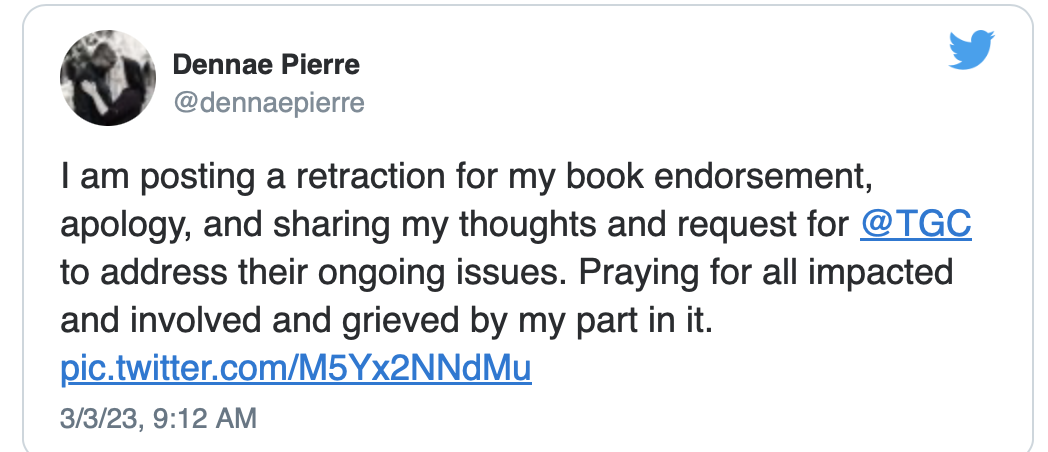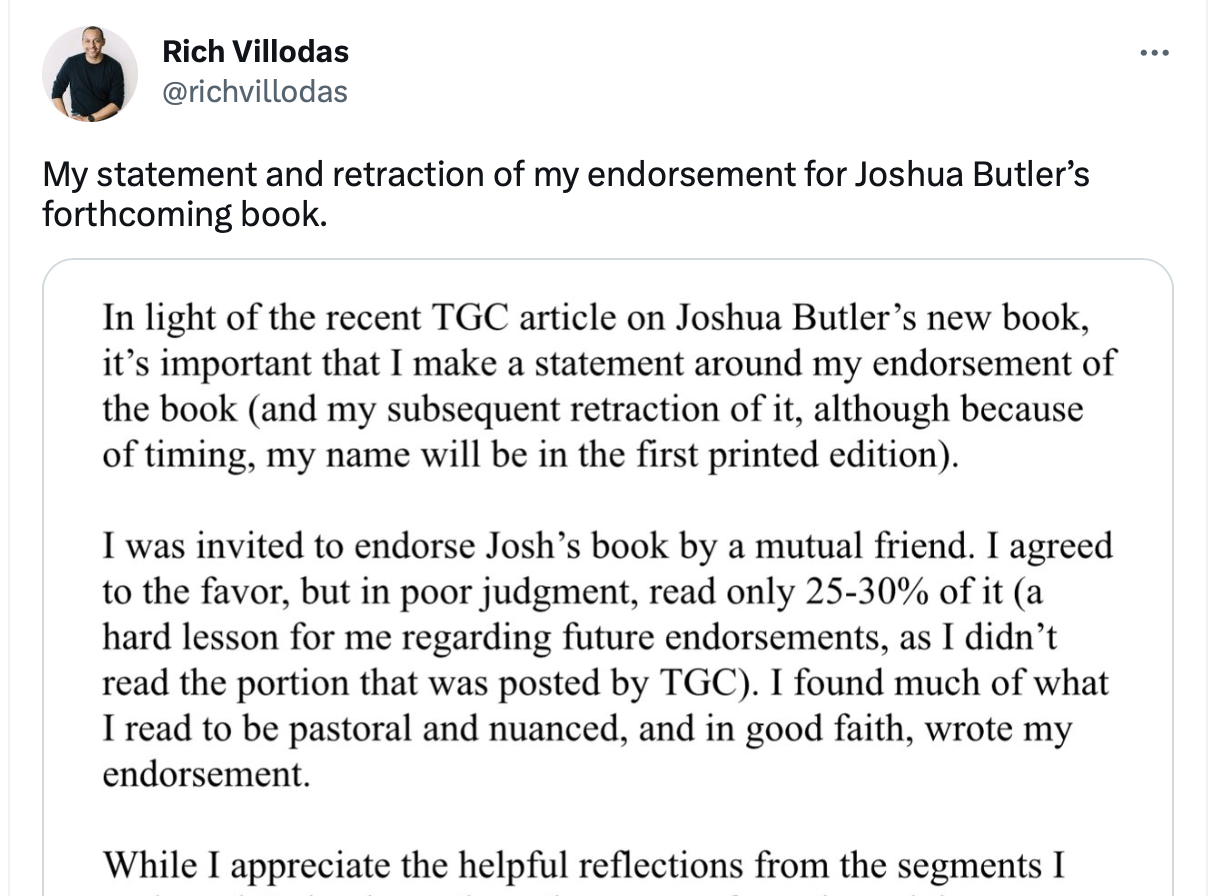In the wake of The Gospel Coalition publishing a male-centric sexual fantasy about Christ penetrating the church, we are getting a clearer picture of how their alliance is characterized by carelessness and control in an attempt to build author platforms by cultivating and protecting their image.
In their founding documents, TGC states: “We often see the celebration of our union with Christ replaced by the age-old attractions of power and affluence, or by monastic retreats into ritual, liturgy and sacrament.” How ironic that they now find themselves caught in a national controversy due to sacramentalizing male power through sexually charged metaphors about their union with Christ.
Julius Kim, president of TGC, released a statement over the weekend that replaced Josh Butler’s original article extolling how the human sexual act symbolizes and sacralizes Christ’s relationship with the church. BNG’s current Clemons Fellow, Mallory Challis, called this the “pornification of Christian women and the church.”

Josh Butler
Butler’s controversial article — it was removed less than 24 hours after it was posted — was an adapted excerpt from his forthcoming book, Beautiful Union. Readers who had found or shared the link to the excerpt were instead greeted Thursday night with a message from Kim, who thanked readers for their feedback and patience as TGC considered how to respond.
Kim said Butler resigned his position as a fellow with the Keller Center, the new apologetics venture TGC has started and named for longtime PCA pastor Tim Keller. Additionally, the study cohort based on Butler’s new book as well as his appearance at the TGC23 conference have been canceled.
“The Keller Center for Cultural Apologetics is a new effort by TGC, and we are still learning how to work with our directors and our fellows to produce content that will serve our readers in a way that is trusted and wise,” Kim said. He went on to promise that TGC would improve its review systems and publication processes to ensure accountability.
A history of sacralizing male sexual hierarchy
This isn’t the first time TGC has used the gospel to sacralize male sexual hierarchy over women. In 2012, they published an article where Jared Wilson quoted Douglas Wilson saying, “The sexual act cannot be made into an egalitarian pleasuring party. A man penetrates, conquers, colonizes, plants. A woman receives, surrenders, accepts. This is of course offensive to all egalitarians, and so our culture has rebelled against the concept of authority and submission in marriage.”
“A man penetrates, conquers, colonizes, plants. A woman receives, surrenders, accepts.”
That 2012 TGC article continued: “Men dream of being rapists, and women find themselves wistfully reading novels in which someone ravishes the ‘soon to be made willing’ heroine.” And this: “True authority and true submission are therefore an erotic necessity.”
The late Rachel Held Evans responded at the time, “What is perhaps most disconcerting is the fact that even after multiple women expressed their concerns in the comment section, both Jared Wilson and Doug Wilson repeatedly dismissed these concerns with exasperation and condescension, ridiculing the commenters’ lack of ‘reading comprehension.’”
TGC doubled down with a follow-up post by Jared Wilson where he claimed the “outrage” simply didn’t understand his larger context. Eventually, TGC published one last article where Wilson thanked those who encouraged him, explained that his original article wasn’t worth “all the mess,” and apologized to members of TGC and complementarians for bringing “ill repute upon you,” as well as to those he offended.
In her final post on the topic, Evans said TGC dismissed the pain and perspective of women and concluded: “The Gospel Coalition’s response to this matter has spoken more loudly than the original post.” Evans noted how TGC’s follow-ups “said a lot about what they don’t mean, but nothing about what they do mean.”
She was left with no answer to the question, “How is complementarian sex supposed to be different than egalitarian sex?”
A pattern of publishing harm and dismissing concern
Lest we think TGC’s publishing practices are limited to two articles across an 11-year time span, Dennae Pierre said in the retraction of her endorsement of Butler’s book after reading his article, “TGC has long frustrated me in what it is willing to publish. … I believe there is a clear need for institutional repentance and organizational change. Why? One reason is the ways they tolerate and promote harmful perspectives of women.”
“The fact that this was published is a serious problem.”
Pierre continued: “But even the fact that TGC publishes content that is harmful to women and the unity of the church is not the only problem. The behavior and lack of apology when they get critiqued is a serious concern. Instead of listening and discerning where they can own even a part of a critique — leaders associated (or claiming affinity to) the brand buckle down and defend. … The fact that this was published is a serious problem.”
 In a response that reflected the behavior Pierre pointed out, The Gospel Coalition pulled Butler’s article, while including a link to read the entire first chapter, assuming that additional “context” would solve everything: “We recognize that the adapted excerpt from Josh Butler’s forthcoming book Beautiful Union lacked sufficient context to be helpful in this format.”
In a response that reflected the behavior Pierre pointed out, The Gospel Coalition pulled Butler’s article, while including a link to read the entire first chapter, assuming that additional “context” would solve everything: “We recognize that the adapted excerpt from Josh Butler’s forthcoming book Beautiful Union lacked sufficient context to be helpful in this format.”
That’s not apologizing for the theology. It’s maintaining they’re still right and that we simply don’t understand.
Brett McCracken
If The Gospel Coalition has any seed of godly sorrow, they must demonstrate it by holding Senior Editor Brett McCracken accountable for publishing Butler’s work in the first place.
When Butler’s article was first published, McCracken tweeted, “One of today’s best Christian thinkers on the theology of sex and gender is @ButlerJosh. His forthcoming book, ‘Beautiful Union,’ is the Protestant magnum opus on sexual ethics we’ve been waiting for.”
While multiple people have since retracted their endorsements for a book they clearly hadn’t read, McCracken’s glowing endorsement is hardly the language of someone who hasn’t read the book. As the communications director and senior editor of TGC’s platform, surely he read the article prior to publication.
But McCracken also has a pattern of dismissing the concerns of women who are facing abuse. He recently complained about the movie Women Talking, calling the true story about women leaving their sexual abusers “an advocacy piece” where “previously silenced women” now have “the power to speak into being whatever reality they desire,” in a celebration of “the empowered self” where “Christianity is seen more as an oppressor than a liberator.”
“If you find it pornographic, that’s because you have a pornographic imagination. And unfortunately, as a culture we have a profoundly pornographic imagination.”
In the time since he published Butler’s article, McCracken liked a Twitter thread by Mark Perkins, who is curate at St. Alban’s Anglican Cathedral, where Perkins said: “Folks upset about @butlerjosh’s piece in @TGC are telling on themselves, one way or another. If you think it’s too icky, that’s because you are a modern prude shaped by 19th-century propriety — private bedrooms for all! … If you find it pornographic, that’s because you have a pornographic imagination. And unfortunately, as a culture we have a profoundly pornographic imagination. The solution is not for @butlerjosh to be more prudish but for your imagination to be healed. … If you can’t figure that out from the text itself, don’t blame @butlerjosh. Become a better reader. … the basic vision is biblical, and the problems with it are really problems with us. Sanctify your imagination.”
Evangelical publishing’s platform priority
One of the concerns many readers have expressed in light of the apologies by Rich Villodas and Dennae Pierre for endorsing Butler’s book has been why evangelical leaders endorse books without reading them completely.
Typically, endorsers are sent advance digital copies of manuscripts after final editing but before publication. They are then asked to provide concise, pithy descriptions that will be used on the book cover and in marketing.
In an interview with Baptist News Global, David Morris of Lake Drive Books shared his thoughts on the topic based on his 25 years of experience in publishing.

David Morris
“We seek book endorsements in publishing to help an author reach an audience and for social proof,” Morris said. “In the special case of academic publishing, for example, books are endorsed in connection with peer review, which is a matter of academic integrity and competence. In general, authors and publishers most desire endorsers who have greater stature in the content area of a given book, or endorsers with larger platforms. Regardless, the author of a book might not know many authors with greater stature or bigger platforms, or they are always aspiring higher.”
Morris said this aspiration is where things get complicated, leading many authors to opt for finding endorsers with whom they already have a relationship. And because of that relationship, the endorser “might decide not to read every word of a book, which you have to imagine happens more than you might realize,” Morris said.
At root, book publishing is a business that relies on platforms and marketing, he added. “Evangelical publishing is big business, bigger than most people realize. There are large sums of money paid by publishers to pastors, parachurch speakers, social media influencers, and today, more celebrities than ever, not necessarily people who are writers, experts or more authentic spiritual thinkers, who bring more substance and are less concerned about form or appearance. As a result, the temptation to lean on individuals with larger platforms and aspire higher is hard to resist, and the temptation of an endorser to get their name on someone else’s book is also strong. That’s when it becomes easier to operate without a real relationship between the author and the endorser, and that’s perhaps when the trouble starts.”
The Keller Center’s image problem
Another irony is that the Keller Center aspires to wield a positive influence — the exact opposite of what Butler’s column and book have created.
 In the initial promo video for The Keller Center for Cultural Apologetics, Tim Keller speaks glowingly about the past: “Even if most people were not devout Christians, there was a positive understanding of Christianity in the culture. The great majority of the people had a positive understanding of the church. And so it was not that difficult to get people in the door.”
In the initial promo video for The Keller Center for Cultural Apologetics, Tim Keller speaks glowingly about the past: “Even if most people were not devout Christians, there was a positive understanding of Christianity in the culture. The great majority of the people had a positive understanding of the church. And so it was not that difficult to get people in the door.”
Note the first words out of Keller’s mouth were about Christianity’s image.
What’s his proposed solution to this image problem?
This: “We want to raise up a new generation of younger thinkers and ministers and leaders who are able to do evangelism and cultural apologetics in a post-Christendom situation or milieu. If The Keller Center is successful, and this younger generation of thinkers and writers and scholars produce great cultural apologetics in a compelling way to secular people — very secular people — the church itself will start to translate this content. You’ll find all sorts of platforms and vehicles for the content that The Keller Center is producing. And if that happens, the reversal of the decline of the evangelical church in this country will take place.”
“The ‘content’ Keller wants to make winsome is connecting the dots for retributive justice and penal substitutionary atonement.”
The “content” Keller wants to make winsome is connecting the dots for retributive justice and penal substitutionary atonement.
Support for Beautiful Union
On one level, the content of Butler’s “magnum opus” about sex fits that desired profile. His theology of sex is rooted in the image of God as an angry male demanding justice for the sins of humanity.
Rather than apologizing for that bad theology, Kim said in response to controversy about Butler’s book and article that TGC simply needs to improve its review systems.
In their minds, however, this all fits together.
Collin Hansen, editor in chief at TGC, explained: “Sex might be the No. 1 reason many people in the West have left the church … . (But) in our lifetime, you might even see large numbers turn to Christ because of the church’s view of sex. If that happens, books like Joshua Ryan Butler’s Beautiful Union will probably play a key role.”
McCracken, senior editor at TGC, said: “Beautiful Union is simply astonishing. Every chapter is full of mind-blowing biblical insights, jaw-dropping theological connections, and a profound reframing of the contentious dimensions of sex. It’s the Protestant magnum opus on sexual ethics we’ve been waiting for and one of the most important books I’ve ever read. … I rarely use the word masterpiece in describing a contemporary work, but it’s absolutely fitting here.”
Andrew Wilson, a fellow with The Keller Center, called it “a compelling piece of sexual apologetics.”
Jen Pollock Michel called it a “marvel. Its simplicity is its profundity; its truth is its love. I finished these pages in tears, my imagination renewed and expanded to consider the pursuing self-giving love God has shown to his people through Christ.” She recommended reading it “to understand the meaning of bodies in sexual union.”
These people are not merely friends who did a favor by writing a review of a book they barely read. They are core leaders of The Keller Center and The Gospel Coalition who are salivating over what they read and who are writing their endorsements through the same apologetic platform lens Keller talked about in the marketing video.
God’s glory and penal substitutionary atonement
Of course, defenders of The Gospel Coalition will say this isn’t about platform building, but about the glory of God and the gospel. And that’s precisely the problem.
They believe in a God who identifies as male and is obsessed with his own glory above all. This god structures reality as a platform building glory hierarchy where the satisfaction of those lower on the hierarchy is maximized by pleasing those higher up on the hierarchy. Thus, children and women are most satisfied when they help, submit and point the attention to the husband. And the husband is most satisfied when he submits to God by exercising his God-imaging authority over women and children.
Their gospel of penal substitutionary atonement is about God satisfying himself through exhausting his holy anger on another. Thus these men imagine God’s self-satisfying by exhausting their horny angst “upon or inside” their wives. The cross is the great orgasm of God, reflected in the satisfaction of patriarchal penises.
“The cross is the great orgasm of God, reflected in the satisfaction of patriarchal penises.”
The problem isn’t that they are disconnected from their theology, but that they are living it out.
That’s why their responses to people calling out their sacralized misogyny — from 2012 through the instances Pierre remembers to Brett McCracken’s handling of Butler’s article — consistently dismiss concerns, blame readers for not understanding the larger context and offer insufficient apologies before covering up their tracks by deleting the articles if enough people call them out on it.
Their carelessness with women and control of women are desperate attempts to convince secular people to think positively about them again by building a coalition of author platforms that cultivate and protect each other’s image, while creatively marketing a message that sacralizes male hierarchy and pleasure through the gospel and the glory of God.
Taking down Josh Butler’s peculiar article won’t solve that problem.

Rick Pidcock
Rick Pidcock is a 2004 graduate of Bob Jones University, with a Bachelor of Arts degree in Bible. He’s a freelance writer based in South Carolina and a former Clemons Fellow with BNG. He recently completed a Master of Arts degree in worship from Northern Seminary. He is a stay-at-home father of five children and produces music under the artist name Provoke Wonder. Follow his blog at www.rickpidcock.com.
Related articles:
Why Women Talking has women talking and complementarian men fuming | Analysis by Rick Pidcock
How viewing sex as an icon leads to the pornification of Christian women and the church as Christ’s bride | Analysis by Mallory Challis
Can pastors please stop salivating over women’s bodies in sermons? A response to Jonathan Pokluda’s objectification of the ‘perfect’ woman | Opinion by Sheila Wray Gregoire


